Una sa lahat, maraming maraming salamat sa mga sumusubaybay dito sa The Extracurricular Being. Marami na po kayong mga nagbabasa nitong blog ko, at labis ko po iyong ikinatutuwa.
At siyempre, pasensya na po kung may katagalan na rin akong hindi nagsusulat ng bagong artikulo dito sa The Extracurricular Being. Opo, medyo abala rin ako nitong mga nagdaang araw. Huwag kayong mag-alala, siyempre ikukuwento ko.
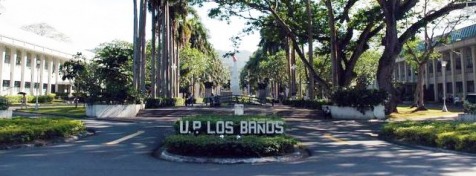 Entrance ng UPLB. I-click ang larawan upang magtungo sa pinagmulang pahina. Nitong nagdaang Biyernes, nagtungo ako sa UP Los Banos para asikasuhin ang mga papeles ko. Babalik kasi ako sa pag-aaral, pero via distance learning. 'Yun 'yung tipo ng pag-aaral naa hindi mo kelangang pumasok sa klase araw-araw, bagkus ay module-based ito o 'di kaya ay online.
So 'yun. Siyempre para makabalik ako sa pag-aaral kelangan lakarin ko mga papeles ko. Aba may utang pa pala ako sa UPLB since year 2000. Hayun, after 10 years nabayaran ko rin! Isipin niyo, kung noon ay mas mura talaga ang tuition fee sa UP (mahal na pag umabot ng anim o pitong libo), naglo-loan pa rin ako kasi hirap ako bayaran, ngayon pa kaya na nuknukan na ng mahal!? Gaano na kamahal? Mamaya natin tatalakayin 'yan.
Napapirmahan ko na sa college secretary namin 'yung mga papeles ko, sumunod naman 'yung director ng Office of Student Affairs, tapos 'yung Vice Chancellor for Instruction. Ayos, isang pirma na lang ang kelangan, at 'yun ay ang pirma ng registrar. Pero wala raw 'yung registrar, nasa seminar daw. Oh hindeh! Sumala pa! Isang dighay na lang lalarga na eh. Balikan ko na lang daw sa susunod na linggo. So VL na naman 'yun!
Wala talaga eh. Diskaril talaga eh. Pero maaga pa naman, so pumunta ako sa bagong campus ng UP Open University sa Los Banos din. 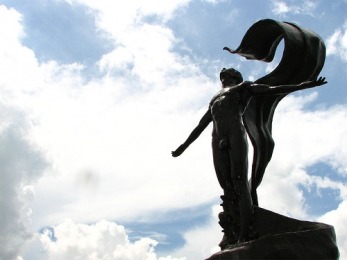 Istatwa ng Oblasyon sa UPOU. I-click ang larawan upang magtungo sa pinagmulang pahina. Aaminin kong mahal ko pa rin talaga ang UP, so kung kaya ko naman ang matrikula ng distance education sa UP, eh 'di sa UPOU na ako mag-eenroll. BA Multimedia Studies ang inisip kong kursong malamang na kunin ko sa UPOU.
Tinanong ko agad kung ang tuition fee rates ba na babayaran ko ay 'yung old rate o new rate. Aba sabi nila new rate daw! Eh Php 1,500 kada unit 'yun, so kung 15 units tumagatinting na Php 22,500 kada sem 'yun! Wala pang miscellaneous fee 'yun ah!
Nampotah naman! Iniisip ko, anlaki ng binabayad kong tax. Nitong nakaraan lang, aba anim na libo ang tax ko! Mabigat 'yun ah! Kung iipunin ko 'yun, may sapat nakong pambayad ng tuition ko sa UPOU. So iniisip ko, sa laki ng binabayad kong tax, aba may karapatan pa nga akong mag-demand na dapat nga libre na tuition ko eh. Do the Math mga pare: kung anim na libo kada buwan at limang buwan kada sem, ibig sabihin kada sem ay Php 30K ang tax ko, sobra-sobra nang pambayad ng tuition ko! Pero wala, magbabayad pa rin ako ng hebigat na tuition fee para makapag-aral sa UPOU. Nyeta, saan ba napunta ang tax ko!?
So 'yun mga pare. Nung umalis ako sa UPOU, mura ako nang mura pauwi.
Lalakarin ko pa rin ang mga papeles ko nang maklaro nako sa UP Los Banos. Malay natin, baka makasikwat ako ng scholarship.
Pero kahit hindi tayo makasungkit ng scholarship, karapatan pa rin nating makapag-aral ng "libre" dahil hindi naman nila ginagawang "libre" ang pagiging Pilipino. Nagbabayad tayo ng tax, at ang totoo niyan sa ganoong paraan binabayaran natin ang karapatan natin sa edukasyon, so tama lang na makuha natin pabalik 'yung pera natin sa pamamagitan ng edukasyong menos gastos dahil nada matrikula.
There goes this saying that if an elected government official is doing his/her job well and not corrupt, you do not call him/her a politician. Instead, we call him/her a public servant. Yet still, the BA Pol Sci course is still Bachelor of Arts in Political Science, not “Public Service Science”. And as observance to usage of respectful language, we practice political correctness. Despite the indispensability of the term “politics”, the said word never fails to enrage us. That’s because traditional politicians, or “trapos” as they are colloquially called, give politics a really bad name. The very same thing happened to the term “academics”. In my previous post regarding Nick Perlas’ education platform, Edward commented, “Nice to see someone's perspective on Nick's platform analyzed in an academic context. I do think that the people's impression of him being an environmentalist overshadows perception of his abilities to change the different sectors of society especially education.” And the beautiful thing about it is Edward appreciated my post despite my well-known counter-academic stance on many issues. It appears that the term “academics” isn’t really that bad at all. It’s just that the differently educated members of our society cannot help but to get stirred up everytime they hear the words “academics”, “school” and even “education”. I have even seen a man wearing a shirt with print design that says, “I was born intelligent, but education ruined me.” The said message reflects the very sad state of the formal education system we currently have, and that’s because traditional academicians gave "academics" a very bad name, just like what traditional politicians did to the word "politics". Traditional academics: a system of blatant prejudice and corruptionAlmost a decade ago, I came across a questionnaire called The 16 Personality Factor Test. It is a questionnaire developed in the 1940’s by psychologist Raymond Cattell that aims to somehow quantify someone’s personality in terms of 16 factors. In the said questionnaire, a person can either hit the low range or high range in each factor. Among the factors in the said questionnaire is reasoning. In the said factor, concrete thinkers hit the low range while abstract thinkers hit the high range. The concrete thinking trait is labeled as “low scholastic ability” while the abstract thinking trait is labeled as “high scholastic ability”. From there, we can immediately see the bias of traditional academics towards the abstract thinkers while deliberately marginalizing the concrete thinkers, directly or indirectly labeling them as incompetent, dumb and/or stupid. I even read a blog that describes concrete thinking as the inability to think abstractly! But are concrete thinkers really intellectually inferior? Do concrete thinkers really literally empty their cups when they are told to do so, just like what the character of Jason did in the movie Forbidden Kingdom? I don’t think so. They just think differently. It is just the abstract thinking academic elitists’ preposterous pride in their cerebral self-gratification, endlessly entertaining themselves with all the gobbledygook their ivory tower can offer and branding those who do not have either the capability or interest to join their game as dull. It is nothing but the pure conceit of the abstract thinking traditional academicians who think their way of thinking is the thinking man’s way. These traditional academicians take pride in their achievements in advancing scientific and linguistic studies. They, after all, are of logical-mathematical and/or linguistic intelligence(s). People of naturalistic and spatial intelligences are fortunate enough to have a special place in the IQ-biased system of formal education, for their talents are essential for the advancement of engineering and biological sciences. But those who possess the musical, interpersonal, intrapersonal, bodily-kinesthetic, and existential intelligences are being placed in the lower sections of the hierarchy of scholastic ability. Hence the unforgiving pressure on the part of students to attain high grades the abstract thinker way. This kind of pressure destroys the students. That’s because a shovel is a shovel. Unfortunately, it cannot be a pail unless it gets molded into one by fire, which will of course inevitably destroy the shovel. And because concrete thinkers are most likely to stay as concrete thinkers, the academic pressure they experience will then force them to cheat their way to the passing grade, all in the name of academic excellence. The situations present two options for the marginalized concrete thinkers: fail by staying true to their intellectual character, or cheat to survive in the academic world. For most students, the choice is easy. Most would rather choose to cheat than to fail for they simply cannot afford to face the persecution of the system of traditional academics. This scheme of “survival of the cheaters” would then be the seeds of the culture of corruption. Imagine this crooked system shaping our children for at least 18 yearsThree years in pre-school, at least six years in elementary, four years in secondary, and at least four years in tertiary. Imagine a discriminatory system of formal education molding our children for at least 18 years. And for us to have a better picture of formal education’s impact to the character development of our children, let’s talk about the number of school hours. When I was in elementary, I had spend six hours per day in school. When I was in high school, it’s up to nine hours. When I was in college, I had to live in a dorm inside the UP Los Banos campus, so I literally lived in a school. Now imagine that amount of time that our children spend in the discriminatory system of formal education. With so much time our children spend in the system of traditional academics, what do you think will they be upon finally graduating? What kind of culture has our system of formal education embedded into the minds and hearts of our youth? Needless to say, a culture of multi-sectoral cooperation is essential for the growth of any country. But instead, our formal education system is promoting a culture of division. We now have lots of college graduates who treat differently educated individuals as uneducated people. We have a lot of graduates from the “big five” universities (UP, Ateneo, La Salle, UST, UA&P) who believe that graduates from other schools are not competent enough. We now have lots of college graduates who look down on blue-collar jobs. I even know a UP student who once said, “Huwag niyo pakinggan ‘yan. Janitor lang ‘yan. Taga-UP ako.” All of a sudden, discrimination transformed itself from a crime to a custom. And instead of raising people who will have the courage to challenge the corrupt system, traditional academics has brought up citizens who are more inclined to just join the system. Instead of fighting for their legitimate rights, the followers of traditional academics just chose to bow down to the will of whoever is in power, just like how concrete thinkers bow down to the rules set by the abstract thinkers way back their school days. And instead of promoting the virtues of honesty and respect by giving concrete thinkers enough room to breathe and teaching abstract thinkers to give way to others, traditional academics has produced cheaters and tyrants. Instead of fostering a culture of integrity, traditional academics instead cultivated a culture of corruption. Now bring that culture into the context of political practice. What we get is a system we now call traditional politics, run by traditional politicians who are experts in the games of cheating and tyranny. What do we replace traditional academics with?Given the monstrous characteristics of traditional academics, we must replace it with a new system that is based on the virtue of respect. We need a system that accepts the student for who he/she is, for what his/her intelligence type is. We need a system that will nurture the child according to his/her intelligence type and learning patterns. We’ve had enough of the formal education system that forces a shovel to be a pail. We’ve had enough of traditional academics that destroys our children’s character and identity. We need to stop the culture of cheating and tyranny from the root. We need to stop it in its early stage. If the formal education system would give students the opportunity to pursue and showcase their own learning regardless of their intelligence type, then we are reducing the chances of cheating in the academic world. Learning things your own way makes studies a lot easier, so why cheat if you already have a good grasp of the school lessons? We need an education system based on the theory of multiple intelligences as proposed by psychologist Howard Gardner. We need to replace traditional academics with multiple-intelligent education. Nick Perlas and his unique platform for education The issue of education has always been a favorite propaganda ground for any presidential candidate in the Philippine setting. That’s because our current education system is plagued by so many problems. We always here all sorts of flowery promises every campaign period, some of them are actually way too formulaic and predictable. Too much has been said, but too little has been done. All candidates promised to make formal education accessible and uplift its quality. We have heard this countless times. Same old song huh! Well, I’ll sing you something new. Upon making my research about the education platform of the presidential candidates for the 2010 election, there’s this one and only candidate who included the advancement of multiple-intelligent education in his platform. The candidate I am talking about is Nicanor “Nick” Perlas. You can view my previous post about his platform for multiple-intelligent education. Also, Pam Fernandez commented in my previous post that here in the Philippines, Ka Nick is among the pioneers of Steiner-Waldorf education, an interdisciplinary educational approach that has found its niche among the artistically inclined. That’s good to hear! That means when Ka Nick talks about holistic education, he knows how to implement it. Addressing one of the roots of corruptionWe Filipinos have been suffering the cancer of corruption for ages. Persecuting those corrupt trapos is something that we can easily see as the solution. Sounds pretty good at first, but it doesn’t go to the root of the problem. We have to bear in mind that corruption is a cultural problem. And as far as molding a child’s culture is concerned, the education system is among the big players, along with family, media, and society. Overhauling the education system is not just an educational agenda. It is also an essential component in the battle against corruption. We need to realize that to crush the corrupt system of traditional politics, we must also defeat the crooked system of traditional academics that raised the traditional politicians during their tender years. Good thing Ka Nick knows how to address one of the roots of corruption, and he is offering us a remedy in the form of multiple-intelligent education. (Click here to view photo source)
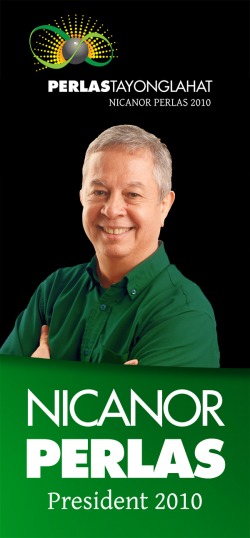 First and foremost, I do not believe in "winnability". So I hope that would shut up people who would try to convince me to vote for more popular candidates just for the heck of "not losing". Anyway, it took me quite a while to decide on who I will vote as president. My friends and relatives know how I strongly considered Dick Gordon and Brother Eddie (whom I actually voted in the 2004 presidential election). But I felt that I was longing for that (pardon me for the term) "Dalai Lama" feel on whoever I will vote. Gordon's resolve and Brother Eddie's idealism are good, but I don't think a plate of pasta or a bowl of ramen can answer a person's craving for a bilao of Pansit Malabon, if you get what I mean. Yes, yes I know. That made you hungry. We are all hungry for change. Well, not really all. Some people are not just hungry. They are starving! That's how much I want to vote for change that I changed the the way I vote. My longing for change has made me brush off popularity and "superficial credentials" as criteria in choosing my candidate. And as an advocate of learning beyond schooling and education beyond academics, I do not believe in the crappy practice of not voting a candidate because he/she is unknown or hindi kilala. That's downright intellectual laziness. Such electoral culture is never compatible with learning and far from educational. Hindi mo iboboto dahil hindi mo kilala? Eh 'di kilalanin mo, problema ba 'yun!?So I made my research. Along the way, one candidate's name and oratorical prowess captured my attention. His name is Nicanor "Nick" Perlas. At first, I was struggling hard to remember where and when I first heard his name. I know that contrary to popular belief, this man is not unknown. He is definitely a household name, at least to a circle of some socio-politically active intellectuals. But when I heard him speak about "sustainable population" in a presidential forum, I said, "Wait, this man is a genius!" The concept of sustainable population is among the principles that brought Brazil from its past condition of poverty to its present economic strength, something that only he and his equally-competent rival Gordon fully explained during the said event. I made my research about Nick Perlas and his platform right after that. And it was very heart-warming for me to find some beautiful things in his platform, things that I admit I can only dream of as of now. But here is Ka Nick who is asking for my vote, for that chance to turn some of my aspirations into walking realities of Filipino life. Who am I to refuse? Here are among my aspirations that are included in Ka Nick's platform: - Advance multiple-intelligent education (especially existential, moral, and spiritual intelligence) in public education and encourage all non-government schools and institutional training and human development programs to do the same. This is one of the things that I strongly advocate as far as reforms in our education system is concerned. It's too bad for me to notice that the current educational system is strongly biased towards some intelligence types (e.g. logical-mathematical) and against the other types (e.g. intrapersonal).
- Implement special adult education programs for the rural and urban poor that would improve their knowledge, creativity, planning, and entrepreneurial and management skills. Oh how I love continuing education! Now that's practical learning. Education must never be confined within the classroom. It must be allowed spill out of the classroom and reach the needy. After all, the final cause of education is self and social welfare.
- Identify the top 100 secondary educational institutions of the country, provide support for their innovative practices, document and disseminate their creative educational practices, and enter into partnerships with them as hubs of educational excellence. Not only Ka Nick is planning to recognize, document, and spread out-of-the-box education methods, but most of all... at long last, we have here a candidate who finally stops talking about amoral academic excellence and instead promotes ethical educational excellence!
- Increase the usage of educational vouchers to widen the choices of parents. Increase focus beyond just quantity of education services to quality of education services including more holistic educational approaches that develop multi-talented, creative, critical-thinking, socially-oriented students and citizens. Now that's another essential aspect of quality education. When it comes to education, we just don't sink our heads in quantity, endlessly tiring ourselves with numbers and statictics. We go way beyond that. We must also tackle the quality of education services that has a more well-rounded holistic approach.
- Host a series of at least 10 global conferences on state-of-the-art frameworks and best practices on multiple-intelligent education, life-long learning, environmental education, appreciative approaches to strategic planning, organizational/societal learning and Theory U, scientific evolutionary spirituality, societal creativity, Lemniscate Approach, and other topics of importance to holistic education and inner change. Wow! That's ambitious, but I can sense Ka Nick's burning desire to put the Philippines in the world map of educational prowess!
Finally, we have here a candidate whose education platform is revolutionary yet realistic. At long last, we have a candidate who is now focusing on issues of lifelong learning, broadening of educational options, promotion of globally competitive educational standards, educational excellence, and multiple intelligent education, issues that for decades have been muffled by ultra-traditionalist academic elitists who want to preserve the current outmoded and prejudiced system of formal education. I admire Ka Nick's practical, no-nonsense view towards education. His sense of holistic and socially responsible education is not only visible in his platform but in his actions as well. Despite his brilliant academic credentials, he knows when to give up scholastic pursuits for the sake of noble socio-political involvement. Particularly, he sacrificed his masteral studies at UP Los Banos to protest against the construction Bataan nuclear plant in 1978. While other politicians have the tendency to brag about their academic credentials, we have here Ka Nick who chose not to give a damn about academic excellence but instead chose the noble path of social responsibility and political action... all these without being a politician! So as a differently educated person, I now know who to vote for president. (Click here to view photo source)
I have told a lot of people that I will be voting for Nicanor "Nick" Perlas. Yet despite Ka Nick's record of career achievements and socio-political action with the grassroots, unfortunately I do not not share the same pick with my friends and relatives. Most of them would vote either for Benigno "Noynoy" Aquino III, Manuel "Manny" Villar, Gilbert "Gibo" Teodoro, or Eduardo "Brother Eddie" Villanueva.
But there's something that I share with most (if not all) of my friends and relatives. We have the same "second choice" for the presidency in mind. That candidate is the good senator Richard "Dick" Gordon.
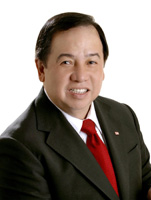 At first, it was Gordon's sense of uncompromising political will that made me consider voting for him, but the fact that we all met at the same political intersection made me think again. There must be something special about Gordon that most wise voters made him their "second choice". Gordon may be more than just a strong-willed and hard-headed presidential aspirant, or a proto-dictator as some would even opine. Gordon may, hopefully, have something under his sleeves that would at long last advance the welfare of the differently educated sector. After all, this senator who is known for his academic AND professional excellence was courageous enough to admit on national TV that he failed his sophomore year in Ateneo due to his own share of teenage mischief. Until a good friend posted a comment in my blog entry about Gibo. My good friend Cheery said that Gordon's thrust is to equip students with trade skills at high school level! Cheery's comment pushed me to research further on what Gordon has in mind as far as reforms in the Philippine educational system are concerned. Trade skills for high school graduates"You will not graduate under my administration in high school without learning a skill that you can work with," Gordon said according to an article from the Philippine Daily Inquirer. Now that makes sense. That thrust does not only uplift the quality of Philippine basic education program but also saves time, money and energy. Let's face it: a lot of our countrymen in remote areas in the countryside are having such a hard time to go to school because of geographical factors that not even infrastructure can totally iron out. This is especially true for the rural upland communities. To require them to be a college graduate to have the something to eat is very insensitive, and to stress the "need" for more masters and PhD degree holders despite the sad reality of their situation (just like what Gibo did) is downright insane. And I believe Gordon's "trade skills for high school graduates" strategy is feasible. Not only I replied to Cheery's comment that I learned basic gardening skills in elementary. But more importantly, in the local corporate world I have been excelling in the field of data processing and management for almost a decade now, and as a differently educated person my high school formal education is the academic attainment that I have been using the most all these years! But of course, we should not just stop in enhancing the Philippine basic education program. No matter how incisive the Philippine education system gets, people will still find it really hard to land a job if the culture of academic elitism prevails and skilled people are not given the chance. A regime of meritocracy: providing Filipinos with opportunityIn the forum sponsored by Carlos P. Romulo Foundation and ANC Channel called "Presidential Policy Forum: Philippine Credibility and Competitiveness in the World" which was held on 15 January 2010 in Asian Institute of Management Conference Center, Gordon said, "The Filipino is a great manager of his talents. What is important is to provide him with the opportunity upon which there is a rule of law, there is a regime of meritocracy." He further added, "That is why he succeeds abroad. When he works hard, he gets good compensation. We make sure that they feel that they are part of the process of making the Philippines A-1." These words immediately reminded me of my memorable experience when I got sent to Wellington, New Zealand for training and process standardization. My Kiwi colleagues did not view me as a college dropout or as an "intelligent" UP student. No academic biases. No discrimination whatsoever. In fact, despite my academic deficiencies my Kiwi colleagues looked at me as an excellent customer master data analyst. That's because my Kiwi colleagues gave me a chance to prove my skills, my worth as a Filipino. I can even fondly remember an instance when a Kiwi colleague was convincing me to migrate to their country when I recited an impromptu poem to her, much to her enthrallment. For me, my New Zealand experience was meritocracy at its best. It's very ironic that it is in New Zealand, a foreign country, where I felt respected as a working soul. How I wish we could have the same thing here in the Philippines. Why require applicants for an entry-level call center position to have a college degree? Why turn down an articulate differently educated applicant in favor of a college graduate whose spoken and written English is far from intelligible? Attractive salary for teachersIf you want good compensation, why would you be a teacher and earn only Php 15,000 if you can earn Php 18,000 by being a call center agent? The result? We have more call center agents who serve as verbal dartboards to foul-speaking customers than teachers who serve as the guides of our children in their educational journeys. Needless to say, any effort to uplift the quality of Philippine education will be useless if we do not pay enough attention to the welfare of our teachers. Gordon's approach to this matter is simple. "Gusto ko, P40,000 ang suweldo ng teacher kaagad in the next 6 years," he said in his website.
Gordon wants our teachers, the noble educators who mold millions of future Filipino professionals every year, to get the kind of compensation that they rightfully deserve. Isn't that beautiful?
Not a big fan of academic elitists
And most of all, I think Gordon is not the kind of candidate who is comfortable with people who overemphasize their academic credentials. He said in an interview with Manila Bulletin, "Communication is not verbal exercise. May laman dapat ang sinasabi mo. Wala kang laman kung wala kang nagawa. Hindi sapat yung pinag-aralan mo, pag hindi alam gamitin yung pinag-aralan mo."
Wow! There's no better way to say that!
A good pick for the differently educated
All these being said, now I can see why lots of people are considering Gordon for the presidency. Aside from his brilliant academic attainment, he also has an impressive record of public service.
And as a differently educated writer, I can say that his views regarding the Philippine education system are more respectable AND respectful than that of Gibo.
(Click here to view photo source)
Bago ang lahat, nais kong linawing hindi ako sang-ayon sa bansag na "artista" sa mga aktor at aktres sa showbiz. Dahil ang salitang "artista" ay "artist" sa wikang Ingles, kung gayon ang salitang "artista" ay nangangahulugang alagad ng sining. Bagama't may mga aktor at aktres namang marunong gumanap, umawit at sumayaw, hindi ako naniniwalang makasining ang pagkaway-kaway at pagpapa-cute ng ilang mga kasapi ng industriya ng showbiz na wala namang mga talento. Pero para sa swabeng ikatatakbo ng ating talakayan, siya sige tawagin pa rin natin silang mga "artista". Leche.
Bueno, heto na tayo. Welcome to the Philippines, ang bansa kung saan ang mga papampam na mga artista ay ang TUNAY na ruling class. Wala akong pakialam kung may ibang mga political analysts kuno na tutuligsa at sasabihing ang mga naghaharing uri ay ang mga panginoong maylupang tulad ng mga Conjuangco, mga burgesya kumprador tulad nina Henry Sy at Lucio Tan, at mga pulitikong tulad ng inyong pinakamamahal na si GMA. 'Yung bagay na si Keanna Reeves ay kaya magpakabobo at magpakapokpok ngunit hindi 'yun magawa ni Gloria, that makes the showbiz people the TRUE ruling class here in Pinas! Intiendes!?
Nakakatawa talaga kayong mga artista, mag-eemote kahit hindi naman marunong umarte, kakanta kahit pangit naman ang boses, sasayaw kahit matigas pa sa marmol ang katawan, nagpupumilit maging host kahit bulol, anlakas mag-effort makipagpalitan ng komentaryo sa mga tunay na broadcast journalists kahit wala namang laman ang mga pinagsasasabi, natuto lang magbasa ng Bibliya naging pastor na kahit wala namang alam sa biblical hermeneutics and homilitics, at higit sa lahat ay tatakbo sa pulitika kapag palubog na ang career.
Lakas ng fighting spirit ah. Mala-demonyo. 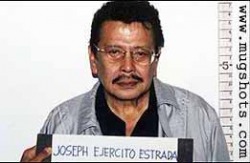 Mugshot of Erap. Click photo to view source. Nagluklok pa kayo ng presidente. Isang presidenteng turaw-turaw na sa loob ng mahigit kumulang tatlong taon ay walang nagawa at ginawa kundi ang magpalaki ng tiyan at net worth. At may apog pang tumakbo ulit kahit sentensyado na sa kasong plunder. In short, kriminal na kumakandidato pa. Tapos ipangangalandakan niya na nung panahon niya pinakamalaki daw ang budget sa education at pinakatahimik daw sa Mindanao? Eh paano niya ipapaliwanag 'yung katotohanang nagkandalabo-labo ang mga academic loads ng mga estudyante sa UP dahil sa sunod-sunod na budget cuts na pinatupad nya sa education budget? Paano niya ipapaliwanag 'yung pambabastos niya sa mga kapatid nating Muslim noong siya, kasama ang kanyang mga chuwariwariwap sa militar, ay pumasok sa isang moske suot ang kanilang mga mapuputik na sapatos at nag-inuman... at lechong baboy pa ang pulutan!?
Sandamakmak talaga kayong mga sinungaling at plastic.
 Banner of AMS. Click photo to view source. At ngayon, gagamitin pa ninyo ang sistema ng party-list representation sa Kongreso. Ano na namang pakulo ito? Alyansa ng Media at Showbiz? Aba kelan pa naging marginalized sector ang mga taga-showbiz, lalo na ang mga artista? Kung tutuusin overrepresented na nga kayong mga artista eh. Sabi nga sa artikulong ito sa Philippine Daily Inquirer, hindi na bago ang pagsasanib ng showbiz at pulitika. Subukan kaya nating bilangin kung ilang mga personalidad nang galing sa showbiz at media ang naging senador. Andami na diba? Ngayon, sa dami nilang naupo na sa Senado at may tig-isa pang naging presidente at bise-presidente, masasabi pa rin ba ng sinumang nasa katinuan na "marginalized sector" ang mga taga-media at showbiz? Ibang klase rin kayong mga artista noh. Ibang level na talaga ang katarantaduhan niyo. Mga artista, marginalized? Ulol! Ano ito, gaguhan? Ang totoo nga niyan, mas "marginalized" pa ang mga pulitiko eh. Gusto niyo patunayan ko? 'Yang pagiging mga haliparot ng marami sa inyo, 'yang pagkakaroon ng maraming asawa, aba kapag pulitiko ang gumagawa ang taumbayan marunong pang magalit. Pero pag kayong mga artista ang gumagawa, ang sasabihin ng mga istupido niyong fans "ganun talaga". May mga pulitiko kahit anong sipag nila, masama ang tingin ng tao sa kanila, sasabihin mga wala silang ginawa. Pero kayong mga artista, kahit wala naman talaga kayong ginagawang nakakatuwa, konting kaway at konting ngiti hayun pinapanood kayo ng mga panatiko ninyong bobo. At higit sa lahat, lahat kami dito sa Pilipinas (kasama ang mga pulitiko at lalong lalo na kaming mga kakaibang edukado o differently educated), aba parang anlaking kasalanan namin kapag hindi kami nakatapos ng kolehiyo, pero kayong mga artista kahit na pabayaan niyo ang pag-aaral niyo para maghubad at magpakandatowad-towad sa harap ng kamera hala sege oks lang! Artista kayo eh. Sa madaling sabi, may pinapairal ang lipunan na sangkaterbang mga double standard na pabor sa inyo. Ngayon, katangian ba 'yan ng isang "maginalized sector"? Hindi kaya sa totoo lang ay "privileged sector" pa nga kayo? Tapos may tigas kayo ng mukha na sumungkit ng puwesto sa Kongreso gamit ang sistema ng party list? O sha sige, alam ko may argumento de mokong kayong tumatakbo kayo upang isulong ang kapakanan ng mga sinasabi niyong "unsung workers and little people" ng industriya ninyong bulok. Puwes, eh 'di mag-nominate kayo ng mga tunay na "unsung workers and little people" tulad ng mga cameraman at PA's, hindi 'yung katulad nina Leo Martinez, Romy Suzara at Manny Calayan! Susmiyoh! At tungkol sa adhikain kuno ng grupo ninyo, gusto ninyong itaguyod ang kapakanan ng mga manggagawa ninyo at bigyan sila ng mga benepisyo tulad ng healthcare coverage? Gusto ninyong mabigyan ng proteksyon sa kalayaan ng pamamahayag? Gusto ninyong isalba ang kalidad ng pelikulang Pilipino? Gusto ninyong masugpo ang piracy? Puwes, hindi niyo kailangan ang Kongreso. Ang kailangan niyo ay ayusin ang MISMONG INDUSTRIYA NIYO, at kahit anong tulong ng Kongreso, Senado, o sino pa mang Poncio Pilatong presidente kung kayo mismo hindi mag-aayos aba wala talagang pagbabagong magaganap! Kausapin niyo ang mga producer niyo o kung sino mang pumopondo sa mga palabas at pelikula niyo. Ipaayos niyo sa kanila ang bayad sa mga cameraman, PA, at iba pang mga trabahador. Ipalabas niyo ang tunay na balita, at hindi yung mga balitang sinala para bumenta. Tantanan niyo na ang paggawa ng mga pelikulang gasgas ang konsepto at kuwento, at bigyan ng break ang mga aktor at aktres na tunay na talentado, hindi 'yung mga artistang porke malaki ang suso ipapaharap niyo sa camera. Aba, pano nga ba naman tataas ang kalidad ng mga pelikula kung niyan? At gusto niyo ba talaga masugpo ang piracy? Aba'y kausapin niyo ang nakaupo sa Optical Media Board na artista rin naman. Subukan niyong mag-isip kahit konti, matutuklasan niyong ang mga problemang nais niyong lutasin sa inyong plataporma kuno ay kayo mismo ang may gawa at kayo rin ang makakaayos. Hindi niyo kelangan pumasok (na naman) sa pulitika para magkalat. Ang utak pakigamit pleeeeaaaase laaaaang! Hindi talaga kayo titigil hanggang hindi niyo nakukuha ang lahat noh? Hindi pa kayo kuntento sa sangkaterbang kapritsong meron kayo? Dapat sa inyo pinuputulan ng sungay para magtanda. Ibang klase talaga ang tigas ng mukha niyo. Taas ang kamay ko sa inyo.
Start at 00:20
Bong Revilla: Ah, doctor... Doctor Hayden Kho.
Hayden Kho: Yes sir.
Bong: Ahm... maliit ang showbiz.
Hayden: Yes sir.
Bong: Marami sa aking nakakapagkuwento na yung videos na kinukunan mo na iba't ibang babae ay pinapakita mo raw sa mga barkada mo. Is this true? You are under oath!
Hayden: Yes I am under oath sir.
Bong: Baka bigla kaming maglabas ng witness dito at sabihin ay {tu ron} totoo 'yon. Mananagot ka.
Hayden: Sir, hindi ko po ito pinapakita kahit kayo sir. At lahat po ng naririnig niyo sa media, kagaya na po ng... alam na po nating lahat 'yan. Paminsan po may sinasabi tungkol sa atin, kahit po sa inyo may sinasabi tungkol sa inyo na hindi po totoo. Minsan po may tumatayo pong witness na sinasabi totoo ito, na sinabi ko na ginawa ko ito, pero hindi po ito katotohanan.
Bong: Okay...
End at 01:15
What a lousy way to "defend" the showbiz sector! Sa dami ng mga pulitikong artistang tulad ni Bong Revilla na puspusan ang pagsusulong sa interes ng showbiz kahit sa ilohikal na paraan, kelangan pa ba talaga ng party-list para sa mga taga-showbiz? O baka sadyang ganun lang talaga kagahaman sa kapangyarihan itong mga lintik na artistang ito na pati ang sistema ng party-list ay kanilang gagamitin!?
Tala ng may-akda: Isinulat ko ang sanaysay na ito noong 2008. Ang sanaysay na ito ang nagdala sa akin sa kauna-unahang iWitness Documentary Seminar na ginanap noong taong ding iyon. Muli kong ipinapaskil dito ang nasabing sanaysay na ito sapagkat walang dudang si Andres Bonifacio ang pinakadakilang kakaibang edukado (o "differently educated" sa wikang Ingles) sa kasaysayan ng ating bayan.
Maraming beses ko nang ginamit ang pangalang Emperor Magdiwang. Bukod sa ito ang ipinangalan ko sa lahat ng mga email accounts ko, nagamit ko na rin ito bilang pen name noong mga taong madalas akong umakda ng mga tula. Nagamit ko na rin ito bilang stage name noong ako ay naging bokalista ng isang banda noong 2004. At kapag naging artista ako, ito rin ang gagamitin kong screen name. Malay natin, ‘di ba?
Sa unang tingin, ang pagpili ko ng isang pseudonym ay tila upang magtunog astig ‘ika nga. Ngunit may mas malalim itong kahulugan.
Nakakalungkot isiping habang humahakot ng pansin ang aking unang ngalang “Emperor” ay siya namang kawalang interes ang inabot ng aking piniling apelyidong “Magdiwang” na siyang mas masarap talakayin. Sa usapin ng pinagmulan ng aking pseudonym, sa mga lumipas na taon ang mga tanong na natanggap ko ay puro patungkol sa aking unang ngalang “Emperor”.
Hindi ko na tatalakayin ang pinagmulan ng aking unang ngalang “Emperor” dahil bukod sa isa itong mahabang salaysayin, ang aking apelyidong “Magdiwang” ay mas nagtataglay ng tunay na saysay at kasaysayan. 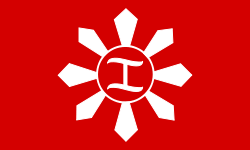 Bandila ng Paksyon ng Magdiwang. I-click ang larawan upang magtungo sa pinanggalingang pahina. Ang aking apelyidong “Magdiwang” ay hango sa isa sa mga paksyon ng Katipunan. Ang Magdiwang ay ang paksyong kinaaaniban ni Andres Bonifacio, samantalang ang kabilang paksyon naman ay ang Magdalo na kinaaaniban naman ni Emilio Aguinaldo. 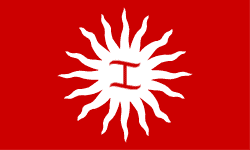 Bandila ng Paksyon ng Magdalo. I-click ang larawan upang magtungo sa pinanggalingang pahina. Aaminin kong dati ay wala talaga akong pakialam tungkol sa kasaysayan ng Pilipinas. Hanggang sa nabanggit sa akin ng isa sa aking mga guro na si Bonifacio ay ipinapatay daw ‘di umano ni Aguinaldo.
Agad kong naitanong, “Kung ganoon, bakit itinuturing na bayani si Aguinaldo?”
Nagsaliksik ako upang malaman ko ang buong katotohanan. Bukod sa pagkakapaslang kay Bonifacio, natuklasan ko rin ang tungkol sa mga paksyon ng Magdiwang at Magdalo at ang alitan sa pagitan nila. Kahit kailan ay hindi ito nabanggit sa mga klase namin sa kasaysayan ng Pilipinas. Natuklasan ko rin ang iba pang mga ‘di umano’y kataksilang ginawa ni Aguinaldo, partikular ang Kasunduan sa Biak na Bato at ang pagkakapatay kay Antonio Luna.
Lalong lumakas ang aking tanong, “Paano naging bayani si Aguinaldo?”
Habang lumalaki ako, lalong lumalakas ang nasabing tanong. Naging masakit ito para sa akin, lalo pa’t laging itinuturo sa mga paaralan na si Aguinaldo raw ang unang pangulo ng Pilipinas at tagapagtatag ng unang republika sa Asya. Masakit sa aking isiping ang aking lupang tinubuan ay naitatag ng pagtataksil at pagkaganid sa kapangyarihan.
Mas naging mahirap sa akin ito nang mag-aral ako sa UP Los Baños, kung saan ang mga estudyante ay kilala sa pagmamahal sa bansang Pilipinas. Ngunit minsan ay nasabi ko sa isang kaklase at malapit na kaibigan, “Bakit ko iibigin ang isang bansang itinatag ng isang kawatan?”
At madalas naitatanong, ”Bakit ganito natin binabasa ang ating kasaysayan?”
Sa mga nababahagian ko ng mga tanong na ito, karamihan sa kanila ay walang sapat na interes upang pag-usapan ang nasabing paksa. Wala silang pakialam.
Sa paglipas ng panahon, nanindigan na akong ang ating unang hakbang tungong kasarinlan ay isang malaking pagkakamali. Bilang isang taong lumaki sa bansang ito, labis akong nahiya sa kasaysayan ng aking sariling bayan.
At mula noon ay ikinabit ko na ang “Magdiwang” sa aking pseudonym bilang apelyido.
Ginawa kong apelyido ang “Magdiwang” sapagkat ang apelyido ay tumutukoy sa angkang pinagmulan ng isang tao. Ito ang lahing nananalaytay sa kanyang dugo. At kung ako ang tatanungin, nais kong dumaloy sa aking mga ugat ang mga adhikain ng paksyon ng Magdiwang.
Lumikha ako ng sariling pananaw: si Andres Bonifacio ang unang pangulo ng Pilipinas, hindi si Emilio Aguinaldo. Sa ganitong paraan kahit paano ay naibsan ang hiyang naramdaman ko sa ating kasaysayan.
Ngunit mahirap ihayag sariling paninindigan kung ito ay napapangibabawan ng mga pamantayan ng iyong kapaligiran. Ilan sa mga ito ay ang pagkakapangalan ng punong kampo ng Sandatahang Lakas ng Pilipinas kay Aguinaldo (Camp Aguinaldo), ang mismong pambansang awit natin ay ang opisyal na piyesang pangmartsa ng paksyon ng Magdalo na nilapatan lamang ng mga titik (ang orihinal na pamagat ng nasabing piyesa ay Marcha Filipina Magdalo), at ang pag-usbong ni Antonio Trillanes at ng kanyang pangkat na Magdalo (at nahalal pa si Trillanes bilang isang senador). 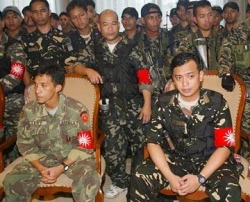 Si Antonio Trillanes IV (pinakaharap, bandang kanan) kasama ang kanyang pangkat na Magdalo. I-click ang larawan upang magtungo sa pinangalingang pahina. Naramdaman ko tuloy na tila wala akong sapat na kakampi sa aking adhikain. Oo nga’t may mangilan-ngilan akong mga nakikilalang kabahagi ko sa ganitong pananaw, ngunit paano namin itatama ang napakaraming mga text book? Paano namin sasabihin sa Bangko Sentral ng Pilipinas na hindi dapat ilagay ang mukha ni Aguinaldo sa limang piso dahil mukha lamang ng bayani ang inilalagay sa pera at hindi mukha ng isang traydor? Kung ihahayag namin ang aming pananaw na si Andres Bonifacio ang kinikilala naming unang pangulo ng ating bansa, may makikinig ba?
Minsan ko nang inisip na bigo na ako sa aking adhikain, ngunit nang ipalabas ng i-Witness ang dokumentaryong “Si Lolo Andres: Unang Pangulo?”, para akong nabunutan ng tinik sa dibdib dahil sa wakas ay naibahagi sa mga manonood ang tunay na Andres Bonifacio. Sistematikong inilahad ng i-Witness ang mga pag-aaral na nagpapatunay na si Andres Bonifacio nga talaga ang unang pangulo ng ating bansa. At taglay ang pambihirang giting, mahusay na inilahad ng i-Witness ang pagkakapatay sa kanya at sa kanyang kapatid na si Procopio. Nabanggit din ang isang pag-aaral tungkol sa umano’y dayaan sa halalan sa Tejeros, kung saan si Aguinaldo ay naging pangulo.
May mga bago rin akong natutunan sa nasabing dokumentaryo, tulad ng pagtawag ni Bonifacio sa ating bansa bilang Katagalugan sa halip na Pilipinas, Filipinas, o Philippines na hango sa pangalan ng hari ng Espanya na si Phillip II. Bakit nga ba natin ipapangalan ang ating bansa sa hari ng ating mananakop?
Ikinagalak ko nang maipalabas sa pambansang telebisyon ang nasabing dokumentaryo. Ikinatutuwa kong ang i-Witness ay naglakas loob na bigyang linaw ang ating kasaysayan. Hindi nakuntento ang i-Witness na bulag na lamang na sumunod sa mga nakasanayang pamantayan, bagkus kanilang ginamit ang kanilang kasanayan sa pananaliksik at pamamahayag upang ang katotohanan ay maibahagi sa mga manonood.
Nakakatuwang isiping bukod sa pakiramdam ko’y nagkaroon ako ng kakampi sa aking pananaw, sa pamamagitan ng dokumentaryong “Si Lolo Andres: Unang Pangulo?” nagkaroon ako ng mas malalim na pagkakaunawa hindi lamang sa ating kasaysayan kundi sa aking sarili. Higit kong naunawaan ang pinili kong landas na nakapaloob sa apelyidong “Magdiwang”.
Hindi ko alam kung maaabutan ko pa ang panahong sina Bonifacio at Aguinaldo ay mailalagay sa kanilang mga tamang lugar sa kasaysayan at sa wakas ay maiwawasto na ang pagkakasulat ng mga kahapon ng ating bansa.
Ngunit sa wakas ay may nagtanong din sa akin, “Nell, ‘di ba Emperor Magdiwang ang name mo sa Yahoo? Maka-Bonifacio ka ba? Kasi maka-Bonifacio rin ako eh.”
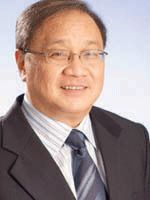 What is a commencement address for? Is it to showcase the verbal or oratory prowess of somebody? Is it to put plain words in the mouth of a somebody in the society so those plain words can magically turn into moving declarations? Or is it way beyond that? A commencement address is like the voice of a coach before basketball players go into the court of the real world and play the game called real life. And after spending four years or more under the "merits over morals" pulse of the academic world, a commencement address must remind the students to embrace the "dignity beyond diploma" mindset as they prepare to join the society's economic activities. But what happens if a commencement address that is supposed to remind college graduates to be dignified encounters ethical issues due to plagiarism? Manuel V. Pangilinan's speech controversyThis last Easter Sunday, I learned about the controversy surrounding Manny Pangilinan's commencement address as delivered to the Ateneo de Manila's graduating class for 2010 (particularly to the graduating class of School of Management & School of Science and Engineering on 26 March 2010, and School of Humanities & School of Social Sciences on 27 March 2010). According to a report from ABS-CBN, Manny Pangilinan (also known as MVP) resigned as Chairman of the Ateneo de Manila's Board of Trustess after admitting that parts of his speeches were copied from from speeches of Oprah Winfrey, J.K. Rowling, and Conan O'Brien. Although he said that he had some help in writing the said speech, MVP took full accountability for the controversy that surrounded the said commencement address. MVP even said, "Wala talaga akong mukhang ihaharap pagkatapos." An academic achiever's honest mistakeMVP is not just a plain degree holder. He graduated cum laude from the Ateneo de Manila university with a degree in Economics, and got his MBA degree from The Wharton School of the University of Pennsylvania. But aside from his academic records, what's more noteworthy about MVP is his underpublicized acts of philantropy. Yet now we have here, on the other hand, a rather overpublicized mistake, which ADMU President Father Bienvenido "Ben" Nebres perceives as an honest one. Why an honest one? Well, I have to admit that I was initially angered by this plagiarism issue. " Bakit ba kasi antanda na niyang si Pangilinan hindi pa niya kaya gumawa ng original speech mag-isa." I, after all, am a differently educated person who can write original speeches and articles all by myself, so I was expecting an MBA holder like MVP to be capable of the same thing. But my dad-in-law commented, " Naku, alam mo namang top executive 'yun, malamang sobrang busy 'yun kaya nag-hire ng writer." Furthermore, Father Ben Nebres noted in his letter to MVP, "In reading again through your speeches, we also see that indeed the main part of your speeches were your story and your thoughts." There I can see the possibility that the writer who "assisted" MVP may have consulted Mr. Google so he/she can beef up the speech by adding parts of commencement addresses delivered by other celebrities. Now that makes more sense to me. A Lenten reflection for the differently educatedThe timing of the controversy is somehow heaven-willed, at least for the differently educated people, for the news about MVP's controversial commencement address spilled out during the Lenten Season. Here we can see a person who can be readily seen not just as a business tycoon but also as an academic achiever committing the infuriating crime of plagiarism. Indeed, MVP is a person whom a misguided radical anti-academic person can easily despise. Yet this same person is facing us now as an embarrassed and broken man, probably asking for forgiveness. What I really find admirable about MVP is not just his humility to issue an apology, but above all his courage to resign as the Chairman of ADMU Board of Trustees. Now that's what we call accountability. We have here a man who admits his mistakes AND faces its consequences, no matter how harsh they may be. MVP proved to us that there should be more than just delivering an "I'm sorry" speech on national TV but refusing to relinquish a government position like the presidency and continue with business-as-usual routines as if nothing horrible happened. No matter how privileged academic achievers appear, we must bear in mind that they are also human beings that can commit mistakes. Like us differently educated people, academic achievers are also souls enveloped in earthen bodies, bestowed with feet of clay so to speak. When an academic achiever commits a mistake, our initial reaction is to call for punitive action. Although I strongly believe in the virtue of justice, the MVP Commencement Address Controversy is teaching us two equally important virtues: repentance and forgiveness. MVP has already shown repentance. I think we should do our share by showing forgiveness. We must give academic achievers the right to experience defeat. We all experience defeats. We all feel pain and embarassment. But isn't it great to realize that academic achievers and differently educated people can also share the same pains (like the pain of job hunting as written in my sub-blog "Requirement: Pleasing Personality") and gifts (like the gift of music as written in my sub-blog "Music Lessons")? Isn't it astonishing to see that even an MVP needs help from his teammates? After all, even an MVP can get fouls. In fact, they're not even immune to injuries. (Click here to view photo source)
Election time is here again. It is the time that some Filipinos view as the perfect opportunity to give the presidency to the one they view as educated as qualified, and not just to a person whose candidacy is sustained by plain popularity. The said scenario particularly apply to those who were "traumatized" by Erap's presidency. 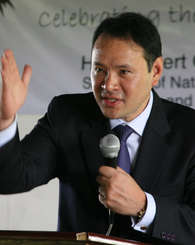 And nowadays, administration candidate Gilbert "Gibo" Teodoro has emerged as the "thinking voter's choice", or rather apparently. At the very least, Gibo now finds himself in the similar situation to that of Raul Roco in 2004. Gibo is now considered as the "most intelligent" among the ten presidential candidates for 2010. However, Gibo's intellectual luster is overshadowed by the current anti-adminsistration sentiments of the society. It's not that I am anti-Gloria (and I am not pro-Gloria either) but let's face it, GMA right now is the biggest liability Gibo got on his back. As I have said, I am neither anti- or pro-Gloria. I would say that as far as my view to the current administration is concerned, it is a mixture of both exceptionally bad (well, I don't have to mention those) and exceptionally good (c'mon, Philippines became a newly industrialized country under the Arroyo regime, and that's something that not even my fave prexy Fidel Ramos was able to do!). But despite my softer-than-expected ire towards the current administration, I would say that I still won't vote for Gibo! I know you can see that I have a different take on the issue of not voting for Gibo. Again, you can see me wearing the hat of the differently educated sector. A big number of his supporters often cite his colorful academic records as their primary reason for supporting him. I know my readers know me well enough by now. Academic excellence never impresses me! Educational excellence does. But again, I would like to clarify that I do not necessarily take good academic records as a fault to a person's character, or a candidate's qualification in this case. But let's take the academic elitists' stubborn arguments for the sake of discussion. Granted that academic excellence can indeed be translated to capability to govern, let's take a look at this academically excellent candidate's program in nurturing the intellect of the Filipino students. The Carlos P. Romulo Foundation and ANC Channel sponsored the event "Presidential Policy Forum: Philippine Credibility and Competitiveness in the World" in Asian Institute of Management Conference Center on 15 January 2010. The presidential candidates present were Richard "Dick" Gordon, Manuel "Manny" Villar, and of course Gilbert "Gibo" Teodoro. In the said forum, Gibo made a statement that clearly revealed his program for the Philippine education system. He said, "In pre-school level, we must start standardizing how we teach pre-school children - computer literacy, English speaking skills and other formative skills. Basic education reform, the road map is already there." He further added, "We have to realign our basic education with international standards, with additional years perhaps. In tertiary education, we must rationalize scholarships and we should have more legitimate PhD and master’s degree holders." Gibo, the so-called "intelligent candidate", did not hit a single note correctly as far as the problem of the Philippine educational system is concerned. He sang way out of tune. What Gibo failed to realize, or at least mention, is that the current crisis encountered by the Philippine educational system can be summed up into two problems: access and quality. First is access. Please, please, please... academic elitists may call me dumb for being a college dropout, but I am smart enough to know this reality and the urgent need to address this problem first and foremost. I don't know how a lawyer like Gibo can miss this very important point, and instead choose to worry about the "need" for more PhD and master's degree holders! Let's get logical about it. How can you expect your people to pursue graduate studies if they cannot even afford the financial cost of a bachelor's degree? Even the Polytechnic University of the Philippines, a known school for the intellectually gifted yet financially challenged students, recently attempted to increase their tuition fee by 2,000 percent! And the sad thing is we now have a corporate world that is already very discriminative to people who got the skills but do not have a bachelor's degree. In stressing the "need" for more PhD and master's degree holders, Gibo is actually creating an even more discriminative system in the local job market! Nowadays, the discriminated sector in the local job market are the "non-bachelor's degree holders". In the system that Gibo is aspiring to create, the discriminated sector will be the "non-master's degree holders". Second is quality. And when we say quality, we do not mean additional years. I am sure everyone here has watched the new TV commercials of Bossing Vic Sotto for Tide detergent powder. Bossing boasted that a spoon of Tide can beat two spoons of other detergent powder brands in terms of cleanliness. Now that's quality! When we say quality, we are embracing the "more in less" principle, meaning it's the school's obligation to make sure to it that students learn a lot in the least time possible. Adding additional years to either elementary, secondary, or tertiary education cannot be readily translated to quality education. Contrary to Gibo's "additional year perhaps" principle, we must actually REDUCE the years of tertiary education. Why is that so? Have you noticed that in a four-year bachelor's degree curriculum, up to two years of it are dedicated for general education subjects that have already been taken up in elementary and high school? Aren't we wasting too much time for allotting half of the curriculum's time table for subjects that students should have already mastered before entering college? This means that immediate reforms in the basic (elementary and secondary) educational system must be done. The basic educational system must be strengthened in such a way that before entering college, students already have enough competence in core skills like language, sciences, and logic-mathematics. And when they enter college, they will be taking major subjects right away. This strategy saves time, and this produces more professionals in less time! And also, when we say quality education, we mean that the bachelor's degree curriculum should already be comprehensive enough to catapult the student to the career related to his/her course. Sure, academic elitists can stick to their four-year formula for bachelor's degree, but they need to make sure to it that engineering students end up as engineers! We don't need more nursing graduates who end up as call center agents. By stressing the need for additional years and graduate studies, what Gibo is actually giving the Filipino people is additional expenses for formal education. We Filipinos are already suffering the unholy cost of formal education way too much. Gibo's program will just make things worse. What Gibo does not know is that his program for the Philippine educational system sounds good only to pedants like him, decorated with all the academic credentials that make him look smart, and blessed with all the money that made him capable of pursuing such credentials. He, after all, is a Cojuangco. But for the typical Filipino workers who feed their families on a minimum wage, Gibo's educational program is a total nonsense. And unfortunately, I do not support candidates who talk nonsense, especially on very important issues like education. (Click here to view photo source)
I am supposed to resume writing this Easter Sunday, but I feel like there's something I really need to write. I need to share to my readers a very simple tip that has helped my nurture my spirituality. After all, today is Lenten Season, a time for reflection. So in my new post in Music Lessons (yes, I have now started writing in this new sub-blog of mine), I wrote how to listen to music for free without "robbing" the artists of their music. I particularly made Real Music artists as examples for their music can help us in our voyage to deeper spiritual understanding. Thanks.
Hi there!
I will be away for quite some days to take some time reflecting this Lenten Season. I will be back next week with new articles, including my first post for my new sub-blog Music Lessons.
Thank you.
|












 RSS Feed
RSS Feed